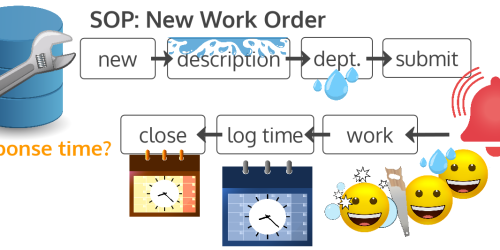SOPs Are Like a Dictionary for Your Business
What type of thing is the dictionary? And why does it matter to your SOPs?
Seemingly Well-defined Words Can Have Ambiguous Meanings
I was recently made aware of confusion over a pretty standard word: “bi-weekly”.
(If you’re using this word in your SOPs and thinking that it accurately indicates the frequency with which something should be done, I’m going to touch on why that might not be the case. But it’s not the central point of this post…..)
According to the dictionary….. If I were to tell you we’re doing something “bi-weekly”, I could be saying:
- every two weeks (a.k.a. every other week)
- twice a week (a.k.a. twice a week, every week)
because “bi-weekly” is defined as “done, produced, or occurring every two weeks or twice a week.” So, by definition, you would be correct in assuming either interpretation.
When it comes to your real-life calendar, though, there’s a big difference between doing something approximately
- 2x/month versus 8x/month.
See the problem?
Dictionaries are Both Normative/Prescriptive Resources and Living Documents
As it turns out, we use a dictionary as if it’s a “normative” or “prescriptive” resource, that is, something that tells us how it is and how it should be done.
But a dictionary is also a living resource, adding new words as they enter the common vernacular and become popular enough to document.
(Remember when “meh” got popularized by the Simpsons in the 1990s and was added to the dictionary?)
That means that a dictionary is also “descriptive“, that is, describing for us how words are used by everyday people – before that description sort of gets enshrined as the way we’re always going to do it now, because the dictionary says so….. (which is when it becomes “normative”/”prescriptive”).
Since “bi” simply means “two”…. It’s kind of natural that when we smooshed together “two” and “weekly”, we ended up in a place where “bi-weekly” could go either way.
It’s also why you might want to start using “semi-weekly” (“semi” meaning “half”) when you want to talk about something that occurs or needs to occur twice per week, and be more explicit with your “bi-weekly” references.
Just in case the interpretation matters…..
How Your SOPs Are Like a Dictionary
Your SOPs – your standardized processes and procedures – are a lot like a dictionary.
- SOPs are descriptive. You start out by documenting a process or procedure according to the way it’s done today.
- SOPs are normative / prescriptive. Once documented, the SOP becomes the go-to for how it should be done.
- SOPs are living resources. The world changes, and your SOPs need to respond. You modify and add accordingly.
And, just like the dictionary might mark a word as “archaic” to indicate it’s not really used anymore, or even remove a word all together …. you might find yourself phasing out or removing a SOP from your SOP repository.
Questions for Your Own SOP “Dictionary”
All of those different characterizations of your SOPs – descriptive, normative/prescriptive, living resource – can make it seem like an overwhelming responsibility to create and manage your SOP repository. Here are some questions to guide you so that this is a manageable task:
- What process or procedure do you need to document so you can start using that document as your go-to for how it should be done?
- These are things you do regularly and need a reliable/consistent result.
- What SOPs haven’t you updated in a while … in spite of algorithm changes or other changes that might influence the way things should be done?
- What SOPs need to be phased out or retired … because following them now is just busywork and no longer feeds the business?
Share your thoughts in the comments!
Want some hands-on help or advice?
If you need help documenting, revising, or retiring your SOPs – or collecting them together into a single repository that’s just as easy to use as a dictionary – let’s connect!





